Toyota Yaris Cross vs VW ID.3 – Differences & prices compared
Compare performance, boot space, consumption and price in one view.
Find out now: which car is the better choice for you – Toyota Yaris Cross or VW ID.3?
The Toyota Yaris Cross (SUV) comes with a Full Hybrid engine and Automatic transmission. In comparison, the VW ID.3 (Hatchback) features a Electric engine with Automatic transmission.
When it comes to boot capacity, the Toyota Yaris Cross offers 397 L, while the VW ID.3 provides 385 L – depending on how much space you need. If you’re looking for more power, decide whether the 130 HP of the Toyota Yaris Cross or the 326 HP of the VW ID.3 suits your needs better.
In terms of consumption, the values are 4.50 L per 100 km for the Toyota Yaris Cross, and 14.50 kWh for the VW ID.3.
Price-wise, the Toyota Yaris Cross starts at 23700 £, while the VW ID.3 is available from 28600 £. Compare all the details and find out which model fits your lifestyle best!
Toyota Yaris Cross
The Toyota Yaris Cross combines the practicality of a compact SUV with the agility of a smaller car, making it ideal for urban adventures. Its elevated seating position offers excellent visibility, while the stylish design ensures it stands out on the city streets. Inside, the Yaris Cross boasts a modern interior with advanced technology features designed to enhance the driving experience.
details @ Toyota
@ Toyota
 @ Toyota
@ Toyota
 @ Toyota
@ Toyota
 @ Toyota
@ Toyota
 @ Toyota
@ Toyota
 @ Toyota
@ Toyota
 @ Toyota
@ Toyota
VW ID.3
The VW ID.3 represents Volkswagen's entry into the world of electric vehicles, offering a modern design that combines functionality with sustainability. Inside, you'll find a spacious and tech-forward interior, providing a comfortable driving experience while maintaining a focus on environmentally friendly materials. The ID.3's performance delivers a smooth and responsive feel on the road, making it a strong contender in the growing electric car market.
details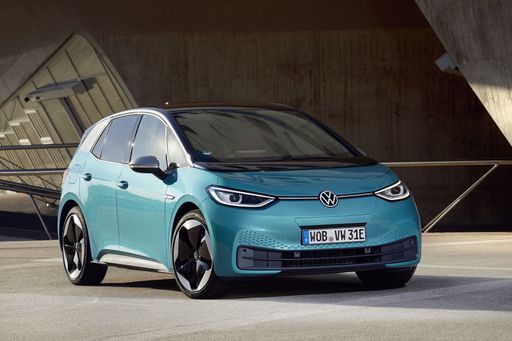 @ Volkswagen
@ Volkswagen
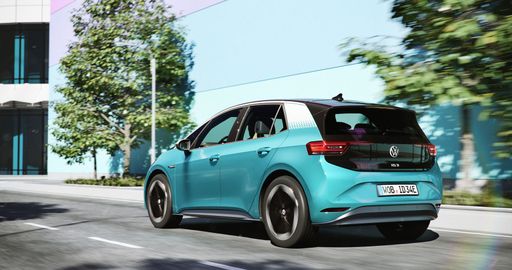 @ Volkswagen
@ Volkswagen
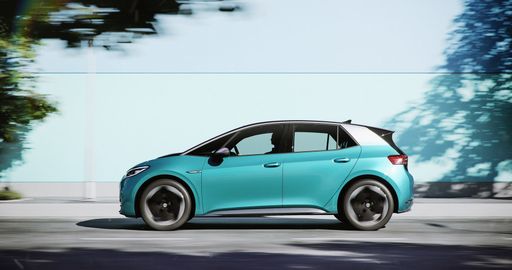 @ Volkswagen
@ Volkswagen
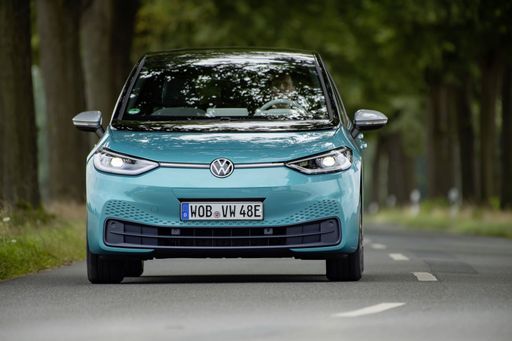 @ Volkswagen
@ Volkswagen
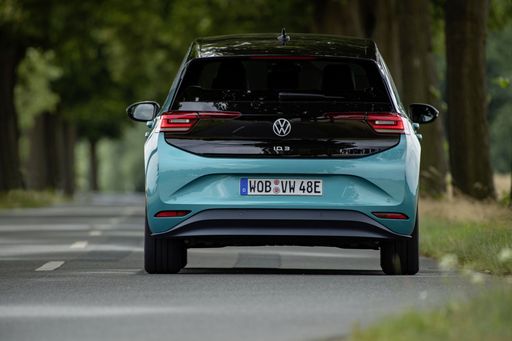 @ Volkswagen
@ Volkswagen
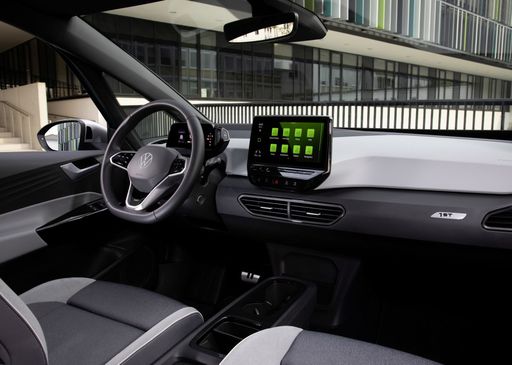 @ Volkswagen
@ Volkswagen
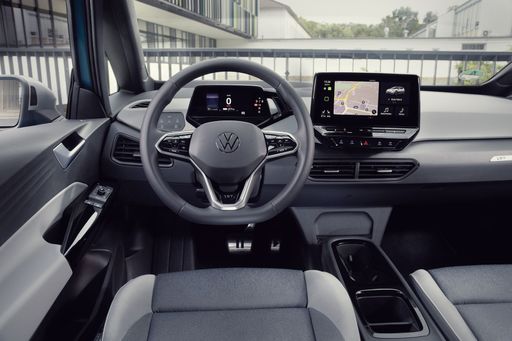 @ Volkswagen
@ Volkswagen

|

|
|
|
|
Costs and Consumption |
|
|---|---|
|
Price
23700 - 34300 £
|
Price
28600 - 49300 £
|
|
Consumption L/100km
4.5 - 4.8 L
|
Consumption L/100km
-
|
|
Consumption kWh/100km
-
|
Consumption kWh/100km
14.5 - 15.8 kWh
|
|
Electric Range
-
|
Electric Range
383 - 605 km
|
|
Battery Capacity
-
|
Battery Capacity
52 - 79 kWh
|
|
co2
101 - 108 g/km
|
co2
0 g/km
|
|
Fuel tank capacity
36 L
|
Fuel tank capacity
-
|
Dimensions and Body |
|
|---|---|
|
Body Type
SUV
|
Body Type
Hatchback
|
|
Seats
5
|
Seats
5
|
|
Doors
5
|
Doors
5
|
|
Curb weight
1180 - 1290 kg
|
Curb weight
1787 - 1993 kg
|
|
Trunk capacity
320 - 397 L
|
Trunk capacity
385 L
|
|
Length
4180 mm
|
Length
4264 mm
|
|
Width
1765 mm
|
Width
1809 mm
|
|
Height
1595 mm
|
Height
1564 mm
|
|
Payload
485 - 510 kg
|
Payload
437 - 473 kg
|
Engine and Performance |
|
|---|---|
|
Engine Type
Full Hybrid
|
Engine Type
Electric
|
|
Transmission
Automatic
|
Transmission
Automatic
|
|
Transmission Detail
CVT
|
Transmission Detail
Reduction Gearbox
|
|
Drive Type
Front-Wheel Drive, All-Wheel Drive
|
Drive Type
Rear-Wheel Drive
|
|
Power HP
116 - 130 HP
|
Power HP
170 - 326 HP
|
|
Acceleration 0-100km/h
10.7 - 11.3 s
|
Acceleration 0-100km/h
5.7 - 8.2 s
|
|
Max Speed
170 km/h
|
Max Speed
160 - 200 km/h
|
|
Torque
-
|
Torque
310 - 545 Nm
|
|
Number of Cylinders
3
|
Number of Cylinders
-
|
|
Power kW
85 - 96 kW
|
Power kW
125 - 240 kW
|
|
Engine capacity
1490 cm3
|
Engine capacity
-
|
General |
|
|---|---|
|
Model Year
2024 - 2025
|
Model Year
2024 - 2025
|
|
CO2 Efficiency Class
C
|
CO2 Efficiency Class
A
|
|
Brand
Toyota
|
Brand
VW
|
Toyota Yaris Cross
Discovering the Toyota Yaris Cross: The Compact SUV Redefined
The Toyota Yaris Cross has boldly entered the compact SUV market, sporting a blend of sleek aesthetics, advanced hybrid technology, and practical functionality. As urban driving dynamics evolve, this vehicle meets the demands of modern motorists with an impressive performance and eco-friendly technology, setting itself apart in a bustling segment.
Performance and Efficiency: Hybrid Innovation at Its Best
The Yaris Cross is designed to provide an engaging driving experience combined with remarkable efficiency. At its heart lies a full hybrid powertrain, offering options between 116 PS and 130 PS, efficiently paired with Toyota's CVT automatic transmission. The hybrid system seamlessly integrates a petrol engine with an electric motor, optimising power delivery and responsiveness.
Drivers will appreciate the low fuel consumption, which ranges from 4.5 to 4.8 litres per 100 km, and equally impressive CO2 emissions of 101 to 108 g/km, aligning with the industry's ongoing commitment to sustainability.
Design and Dimensions: Compact Yet Spacious
The Yaris Cross offers a perfect blend of compact design and interior spaciousness, making it an ideal choice for urban environments. Measuring 4,180 mm in length, 1,765 mm in width, and 1,595 mm in height, the vehicle manages to provide a refined SUV stature without sacrificing manoeuvrability.
Its five-door layout and flexible boot space, ranging from 320 to 397 litres, make it practical for everything from city commutes to weekend getaways. The increased ride height adds to the SUV appeal, providing drivers with that coveted higher driving position and improved visibility.
Advanced Technology and Features
The Toyota Yaris Cross is well-equipped with an array of technological features, defined by its various trim levels including the Business Edition CVT, Comfort CVT, and the sporty GR Sport CVT. Each model is crafted to cater to diverse consumer needs, whether one prioritises enhanced comfort, sporty aesthetics, or comprehensive safety features.
Key innovations include a state-of-the-art infotainment system, advanced driver assistance features, and the Toyota Safety Sense package that enhances driver confidence through adaptive cruise control, lane keep assist, and more.
Driving Experience: Safety and Comfort in Focus
The Yaris Cross is not just about performance but also ensures safety and comfort for all occupants. The vehicle offers a smooth and quiet ride thanks to its refined suspension system and cleverly designed cabin, reducing noise and vibration levels.
The advanced safety suite within the Yaris Cross, encompassing multiple airbags, stability control, and a host of driver assistance systems, is designed to provide protection and peace of mind, every time you step into the driver's seat.
Conclusion: A New Benchmark in the Compact SUV Segment
The Toyota Yaris Cross stands as a testament to Toyota's commitment to producing environmentally friendly vehicles without compromising on performance or style. It strikes a harmonious balance between innovation, efficiency, and practicality, offering consumers a compact SUV that is both exciting to drive and easy to live with.
As we move further into an era of hybrid advancements and smarter automotive solutions, the Yaris Cross embodies these principles exceptionally, proving to be a robust and reliable partner for the modern driver.
VW ID.3
Introducing the VW ID.3: A New Age of Electric Driving
In the ever-evolving world of electric vehicles, Volkswagen stands as a beacon of innovation and sustainability. The VW ID.3 is the marque’s answer to a cleaner future, presenting a stylish and practical hatchback that captivates the eco-conscious yet demanding motorist. With variations that cater to diverse preferences, the ID.3 sets a new standard in the electric vehicle segment.
Performance & Efficiency: Pure Electric Power
The VW ID.3 offers a dynamic blend of performance and efficiency with power ranging from 170 to 326 PS. This is translated into on-road finesse by its automatic gearbox and rear-wheel drive configuration. Drivers can expect an impressive range between 383 to 604 km on a single charge, thanks to the vehicle’s efficient energy consumption which sits between 14.5 to 15.8 kWh/100km. Catering to various driving styles, it delivers acceleration from 0 to 100 km/h in just 5.7 to 8.2 seconds, all while maintaining zero emissions on the road.
Innovative Technology: Beyond the Basics
Volkswagen has embedded advanced technological features into the ID.3 to enhance user experience. The vehicle boasts a reduction gearbox designed for peak efficiency and seamless driving. It also comes equipped with the latest infotainment systems, a digital cockpit and safety features that elevate both convenience and security to new heights.
Design & Comfort: Spacious and Sleek
With a length of 4264 mm and a width of 1809 mm, the VW ID.3 comfortably accommodates five passengers while offering a generous 385-litre boot capacity. The sleek, streamlined silhouette is complemented by a spacious interior design prioritizing both comfort and sophistication. Crafted for the modern driver, the ID.3 offers features like adaptive ambient lighting and adjustable seating, ensuring a journey as pleasant as the destination.
Environmental Impact: Driving Towards Zero Emissions
Aligned with the target of reducing carbon footprints, the ID.3 performs strongly with a CO2 emission rating of 0 g/km, holding a proud A-class CO2 efficiency rating. By embracing sustainable materials and methods, Volkswagen reduces the life-cycle emissions of the ID.3, making it a hallmark of eco-friendly vehicle innovation.
The Verdict: A Smart Choice
The VW ID.3 represents a critical step forward in the era of electric mobility. With an enticing price range of €36,900 to €52,295, it offers a balance between value, sustainability, and tech-laden driving experience. Whether for city errands or long journeys, the VW ID.3 stands out with its commitment to innovation and environmental stewardship, making it an exemplary choice for today's discerning driver.
What drive types are available for the Toyota Yaris Cross?
The Toyota Yaris Cross is available as Front-Wheel Drive or All-Wheel Drive.
The prices and data displayed are estimates based on German list prices and may vary by country. This information is not legally binding.
